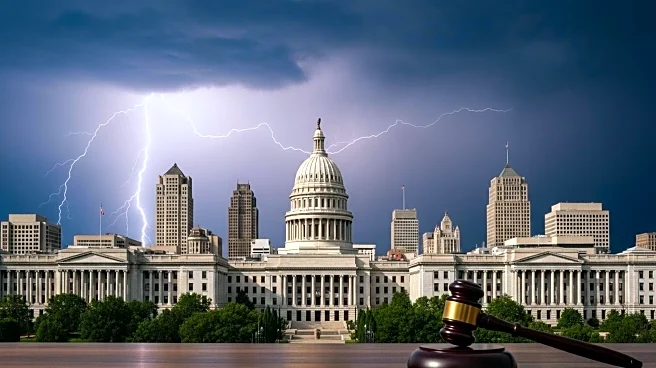What's Happening?
Washington, D.C.'s top elected officials, including Mayor Muriel Bowser, Council Chairman Phil Mendelson, and Attorney General Brian Schwalb, have expressed concerns over President Trump's federal law enforcement surge in the city. During a House Oversight Committee hearing, they argued that the surge undermines public trust and threatens the District's autonomy. Despite crime rates reaching 30-year lows, the leaders emphasized the need for long-term federal support rather than armed National Guard patrols. They urged Congress to fund new facilities, confirm judges, and support efforts to restore the Metropolitan Police Department's ranks. Criticism was directed at the legality and effectiveness of the federal surge, with Schwalb highlighting the negative impact on community-police trust.
Why It's Important?
The pushback from D.C. leaders underscores the tension between federal and local governance, particularly in the nation's capital. The federal surge, characterized by the deployment of National Guard troops and federal agents, raises questions about the balance of power and the role of federal intervention in local matters. The leaders' call for congressional support highlights the need for sustainable solutions to public safety that respect local autonomy. The situation also reflects broader debates on crime management and the effectiveness of federal involvement in local policing, which could influence future policy decisions and federal-local relations.
What's Next?
The D.C. leaders have urged Congress to address longstanding vacancies in the D.C. courts and fund a new psychiatric residential treatment facility for youth. As the city prepares for the 250th anniversary of the U.S., Mayor Bowser emphasized the opportunity to enhance safety and beauty in the capital. The hearing also saw contrasting views from House Oversight Chairman Rep. James Comer, who supported Trump's actions, and Ranking Member Rep. Robert Garcia, who criticized Trump's involvement in D.C. affairs. The ongoing debate may lead to further discussions on federal and local roles in public safety and governance.
Beyond the Headlines
The federal surge in D.C. raises ethical and legal questions about the use of federal power in local jurisdictions. The deployment of masked agents and National Guard troops without local coordination could set a precedent for future federal interventions in cities across the U.S. The situation also highlights the importance of community trust in effective policing, which could be jeopardized by unilateral federal actions. The broader implications may include shifts in public policy regarding federal involvement in local law enforcement and the preservation of local autonomy.










